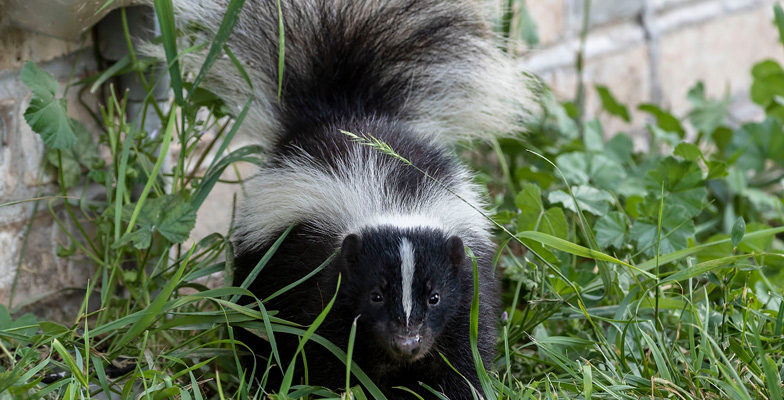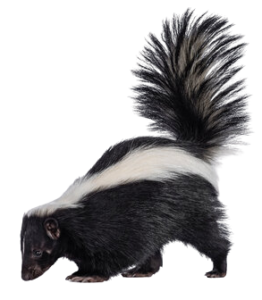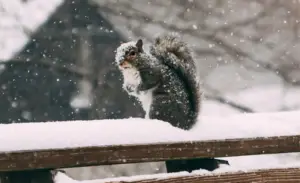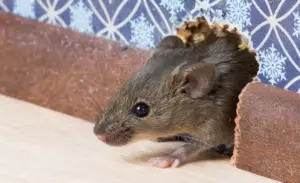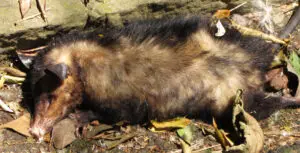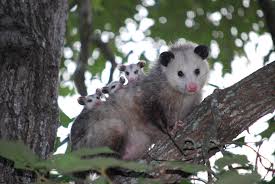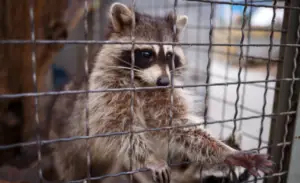As temperatures drop across Southwestern Ontario, Essex County homeowners face a unique seasonal challenge: wildlife seeking warmth and shelter in and around human dwellings. Among these unwanted winter guests, skunks present particularly challenging problems for local Windsor residents. Understanding why these creatures seek refuge under your home and how to address the situation humanely and effectively is essential for maintaining your property’s integrity and your family’s peace of mind.
Understanding Skunk Behavior in Winter Months
Skunks don’t fully hibernate, but they do enter a state called torpor during the coldest winter months in Essex County Ontario. During torpor, these wild animals become less active, their body temperature drops, and they sleep for extended periods to conserve energy when food is scarce. This semi-hibernation state makes finding suitable winter shelter absolutely critical for their survival.
It’s important to note that skunks are nocturnal, typically foraging for food at night and resting during daylight hours. Additionally, skunks are poor climbers, which is why they typically seek shelter at ground level rather than in trees or elevated structures.
In the wild, skunks would naturally seek shelter in hollow logs, abandoned burrows, or natural rock formations. However, urban and suburban development throughout Windsor and Essex County has significantly reduced these natural habitat options, forcing these local wildlife species to adapt by seeking alternatives—often underneath human structures or in crawl spaces of residential properties.
Why Skunks Choose Your Property in Winter
Several factors make the space beneath your home, basement, or garage particularly attractive to skunks living on your property during winter:
- Consistent Warmth: The area beneath your home maintains a more stable temperature than the outside environment, providing insulation against extreme cold spells common in Essex County.
- Protection from Predators: Confined spaces under porches, decks, sheds, garage foundations, and crawl spaces offer protection from natural predators like coyotes and great horned owls.
- Proximity to Food Sources: Residential areas often provide reliable food sources through compost piles, trash containers, pet food left outdoors, and bird feeders. Skunks readily scavenge through unsecured trash for food scraps during winter months.
- Dark, Quiet Environment: Skunks prefer dark, secluded spaces for denning, making the undisturbed areas beneath homes ideal.
- Breeding Season Preparation: Female skunks begin seeking denning sites in late winter for their upcoming breeding season, which typically begins in February.
Signs of Skunk Activity Under Your Essex County Home
Identifying skunk presence early can help prevent more significant problems. Here are the telltale signs that skunks have taken up residence on your property:
Visual Indicators
- Entry Holes: Freshly dug holes approximately 4-6 inches in diameter around your foundation, deck, or shed
- Tracks in Snow: Five-toed footprints in the snow leading to and from your home’s foundation
- Disturbed Insulation: Visible damage to under-home insulation or duct-work
- Nocturnal Activity: Sightings of skunks during dawn or dusk hours around your property
Auditory Clues
- Scratching or Rustling: Sounds of movement beneath floorboards, especially during evening hours when skunks become active
- Vocalizations: Soft grunting or squeal sounds during breeding season in February
Olfactory Evidence
- Persistent Musky Odor: Even without spraying, skunks emit a mild musky smell that becomes more noticeable when they’ve established a den
- Periodic Spray Scents: The unmistakable skunk spray odor following disturbances near their den site
Health and Property Risks Associated with Skunk Infestations
While skunks generally avoid confrontation with humans, their presence under your home presents several concerns for Essex County residents:
Structural Damage
- Digging that compromises foundation integrity
- Damage to insulation and vapor barriers
- Chewing on electrical wiring, creating fire hazards
- Destruction of HVAC ducting and plumbing components
Health Concerns
- Potential transmission of rabies through bites or scratches
- Spread of parasites like roundworms and fleas
- Respiratory issues from accumulated waste and urine
- Unpleasant smells and strong odors that can penetrate living spaces and cause discomfort
- Potential threat to household pets when skunks feel cornered or threatened
Landscape Damage
- Digging in lawns and gardens while searching for grubs and insects
- Damage to ornamental plants and vegetable gardens
- Disruption of irrigation systems through burrowing activity
Prevention: Keeping Skunks Away From Your Essex County Home
Taking proactive measures before winter sets in is the most effective approach to preventing skunk problems. Consider these prevention strategies:
Habitat Modification
- Seal Access Points: Inspect your home’s foundation, garage, basement windows, decks, and outbuildings for potential entry points and seal them with hardware cloth buried at least 12 inches deep and extending outward in an L-shape.
- Remove Attractants: Secure trash and garbage bins with wildlife-resistant lids, feed pets indoors, remove outdoor food sources, and clean up fallen fruit from trees.
- Reduce Grub Populations: Treat your lawn for grubs in late summer/early fall to eliminate this food source that attracts skunks.
- Install Motion-Activated Devices: Motion-activated sprinklers or lights can deter skunks from approaching your home and garage areas.
Yard Management Practices
- Eliminate Shelter Options: Remove brush piles, stack firewood away from structures, and clear overgrown vegetation.
- Install Proper Fencing: Consider installing fencing that extends 12 inches below ground level to prevent digging.
- Apply Repellents: Use commercial repellents or natural deterrents like ammonia-soaked rags around potential entry points (use with caution and follow manufacturer guidelines).
Professional Removal: When DIY Methods Aren’t Enough
If you discover skunks have already established themselves under your Essex County home, professional wildlife removal services offer the safest and most effective solution. Here’s why professional intervention is recommended:
Expertise in Humane Removal
Professional wildlife technicians understand skunk behavior patterns specific to the Essex County region and use humane exclusion methods that prevent harm to the animals while effectively removing them from your property.
Complete Property Assessment
Trained wildlife specialists conduct thorough inspections to identify all entry points, assess damage, and develop comprehensive exclusion plans tailored to your specific property.
Proper Handling to Prevent Spraying
Professionals have specialized equipment and techniques to reduce the risk of defensive spraying during the removal process.
Long-Term Solutions
Beyond removal, professional services include:
- Proper sealing of entry points with wildlife-proof materials
- Installation of one-way doors that allow skunks to exit but prevent re-entry
- Damage remediation recommendations
- Deodorization services if spraying has occurred
The Pro Trap Approach to Winter Skunk Problems
At Pro Trap Wildlife Removal & Pest Control, we understand the unique challenges Essex County homeowners face with winter wildlife intrusions. Our professional animal control approach includes:
- Thorough Property Assessment: Complete inspection of your residential properties to identify all actual and potential entry points, including basements, garages, and crawl spaces where these notorious winter visitors may seek shelter.
- Customized Removal Plan: Development of a removal strategy that considers the specific situation with skunks living on your property, your property layout, and the presence of young (important during late winter when kits may be present).
- Humane Exclusion Methods: Implementation of humane removal techniques that ensure these wild animals’ safety while effectively resolving your problem and eliminating any threat to your family or pets.
- Comprehensive Animal-Proofing: Securing your home against future wildlife intrusions with professional-grade materials and techniques designed to prevent wild animals from accessing your property.
- Cleanup and Sanitization: Addressing any contamination issues from skunk occupation to protect your family’s health and eliminate lingering unpleasant smells.
When to Call for Professional Help
Timing is crucial when dealing with skunk problems. Contact a professional wildlife removal service if:
- You notice signs of skunk activity around your foundation, garage, or trash areas
- You detect persistent skunk odor near your home
- You observe digging around your property’s perimeter
- You hear unusual sounds beneath your home’s floors or in crawl spaces
- You’ve had previous skunk encounters on your property
- You’re concerned about wild animals that might threaten pets
- You suspect skunks are accessing your trash repeatedly
Early intervention prevents more extensive damage and reduces the likelihood of multiple animals establishing dens under your home.
ProTrap: Maintaining a Skunk-Free Property Year-Round
While winter presents unique challenges with skunk intrusions in Essex County, understanding these species’ behavior patterns and taking proactive steps can help protect your property. Professional wildlife removal services offer the expertise, equipment, and techniques necessary to humanely address established skunk problems and prevent future occurrences.
By combining habitat modification, regular property maintenance, proper trash management, and professional assistance when needed, Essex County homeowners can enjoy peace of mind knowing their homes are protected from unwanted winter wildlife guests.
If you’re experiencing skunk problems this winter, don’t wait until the situation escalates. Contact Pro Trap Wildlife Removal & Pest Control for expert assistance throughout Windsor and Essex County, and reclaim your property from these wild animals.
Pro Trap Wildlife Removal & Pest Control provides professional wildlife removal and exclusion services throughout Windsor, Essex County, Chatham Kent, and Sarnia. Our licensed and insured technicians specialize in humane wildlife management solutions for residential and commercial properties.
